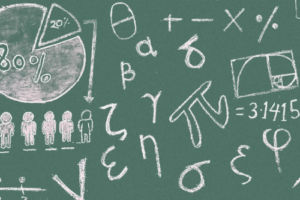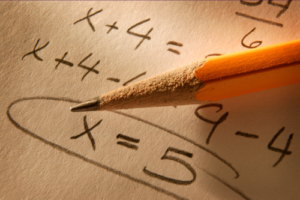5rd Grade Math Struggles?
Here is How to help
by Ash Kirkland
Fifth grade marks a significant transition in math education. Students are introduced to more advanced topics such as fractions, decimals, basic algebra, and geometry. While this can be exciting, it can also be overwhelming. In fact, according to the School Pulse Panel, 40% of public school students started the 2024–25 school year behind grade level in at least one subject. As math becomes more complex, it’s crucial to support your child to prevent them from falling behind.

Common Challenges in 5th Grade Math
Fifth graders face several challenges as they work with more advanced math concepts. Here are some of the most common difficulties:
Fractions and Decimals
Fractions are a major focus in fifth grade, and many students struggle with operations like adding, subtracting, multiplying, and dividing fractions. Understanding equivalent fractions and converting fractions into decimals can also be challenging. This is a critical area that builds the foundation for many other math concepts.

Long Division with Decimals
By this grade, students are expected to divide large numbers, sometimes including decimals. Long division with decimals involves multiple steps, which can be overwhelming. It’s important to practice this skill until it feels more intuitive.

Multi-Step Word Problems
The fifth-grade curriculum includes complex word problems that require multiple operations, such as addition, subtraction, multiplication, and division. Students often struggle with identifying the key information, organizing their work, and deciding how to approach the problem. Learning to break these problems down into smaller steps is essential.
Geometry and Measurement
Students are introduced to volume, surface area, and other advanced concepts in measurement. They also need to understand how to work with different units of measurement and convert between them. This can be difficult for many students, especially when it involves multi-step conversions.
Data Interpretation
Graphs, charts, and tables are often used in fifth-grade math. Students are required to analyze data and draw conclusions from it. This is a challenging task, particularly for students who struggle with reading comprehension, as they need to be able to extract the relevant information and interpret it accurately.

Basic Algebraic Thinking
Fifth graders begin working with variables and simple algebraic expressions. Concepts like solving for an unknown number and recognizing patterns in numbers or equations can be difficult for students who are new to algebra. It is critical to help students develop a solid understanding of algebraic thinking to set them up for success in middle school and beyond.
Math Anxiety and Confidence Issues

As math gets harder, some kids start to develop math anxiety. The fear of getting answers wrong can make them hesitant to try, leading to avoidance and frustration. If they feel like they’re constantly making mistakes, they may start to believe they aren’t good at math, even when that’s not true.
How to Support Your Child in Math
Fifth grade math can be challenging, but there are several strategies you can use to help your child build confidence and master new concepts. Here’s how you can make a difference:
Spend Time With Them
One of the best ways to support your child is by spending time with them during their math homework. Ask them about what they’re learning, and encourage them to explain the concepts in their own words. Teaching someone else reinforces their understanding and boosts their confidence. Let them show you what they know and praise their effort, even if they are still working on getting the right answers.

Guide, Don’t Solve, When Helping With Homework
If your child gets stuck, instead of giving them the answer, guide them through the problem with thoughtful questions like:
- “What do you already know about this problem?”
- “Can you break it into smaller steps?”
- “Does this remind you of something you’ve done before?”
This approach encourages them to think critically and develop problem-solving skills, while also making sure they understand the methods being taught in class.
Stay in Touch With Their Teacher
If your child is struggling, don’t hesitate to reach out to their teacher for support. You can ask:
- “What strategies are being used in class for fractions or algebra?”
- “Are there extra practice materials or online resources available?”
- “What common mistakes should I watch for when helping at home?”
Teachers can provide valuable insights and offer additional resources to support your child’s learning.
Make Math Part of Everyday Life
Math isn’t just something that happens in the classroom—it’s everywhere. Encourage your child to see the connection between what they’re learning and real-world applications. Here are a few examples:
- Cooking: Have your child help measure ingredients, double a recipe, or convert fractions in recipes.
- Shopping: Ask them to calculate discounts, compare prices, or determine how much change they should receive.
- Time Management: Teach them to calculate elapsed time when planning activities or schedules. These everyday activities allow your child to practice math in a practical and fun way, making it feel more meaningful.

Promote Independent Study Habits
As students move through fifth grade, they are expected to become more independent in managing their work. It’s a good time to start encouraging your child to develop strong study habits. Help them establish a consistent routine for homework and time management. Let them practice setting their own goals, taking breaks when needed, and staying focused on tasks. Encouraging independence will build confidence and better prepare them for middle school.
Actions Your Child Can Take
There are several strategies your child can use to strengthen their math skills and become more confident. These are simple yet effective ways for them to practice and improve:
Use Flashcards
Flashcards are a great way to reinforce multiplication, division, fractions, and even basic algebra. Your child can make their own flashcards or use free online resources like Quizlet.com. Flashcards encourage quick recall, which helps build a solid foundation for more complex problems. They can be used for practicing fraction equivalents, multiplication tables, or even simple algebraic equations.
Practice Without a Calculator
While calculators can be helpful, relying on them too much can slow down mental math skills. Encourage your child to solve problems on their own before checking with a calculator. This practice will help them develop stronger problem-solving skills and improve their ability to work through math problems without external aids.

Bring Home All Materials
A common struggle for fifth graders is forgetting their materials at school. Encourage your child to double-check their backpack before leaving class to make sure they have their textbooks, assignments, and any graded work. Having everything they need at home will help them stay organized and prepared to practice math independently.
Read Word Problems Out Loud
Word problems are a combination of math and reading comprehension. Have your child read the word problem aloud to help them process the information and break it down into manageable steps. This approach reinforces their understanding and ensures they don’t miss important details. It also gives them practice with reading comprehension while solving math problems.
Show Their Work
Fifth-grade math problems often involve multiple steps, so it’s important for your child to show their work. This practice helps them stay organized and ensures that they are following the correct steps to solve a problem. It also makes it easier to pinpoint where they may be making mistakes. Showing their work will help them build strong problem-solving skills.

Use a Planner
A physical planner can help your child stay organized by keeping track of assignments, test dates, and due dates. Writing things down helps them stay focused and improves time management skills. It’s also a good way for them to learn responsibility by keeping track of their schoolwork independently.
Practice Time Management
Encourage your child to set aside a specific time each day for math homework. Breaking their work into smaller chunks and taking short breaks can help them stay focused and prevent them from feeling overwhelmed. This practice not only helps with math homework but also builds good time-management habits for all subjects.

Fifth grade math can be challenging, but with the right support and habits in place, your child can build confidence and master new skills. Small efforts, like practicing fluency, staying organized, and working through problems step by step, can make a big difference. As your child faces more complex math topics, your encouragement and involvement will help them stay motivated and confident in their abilities.


